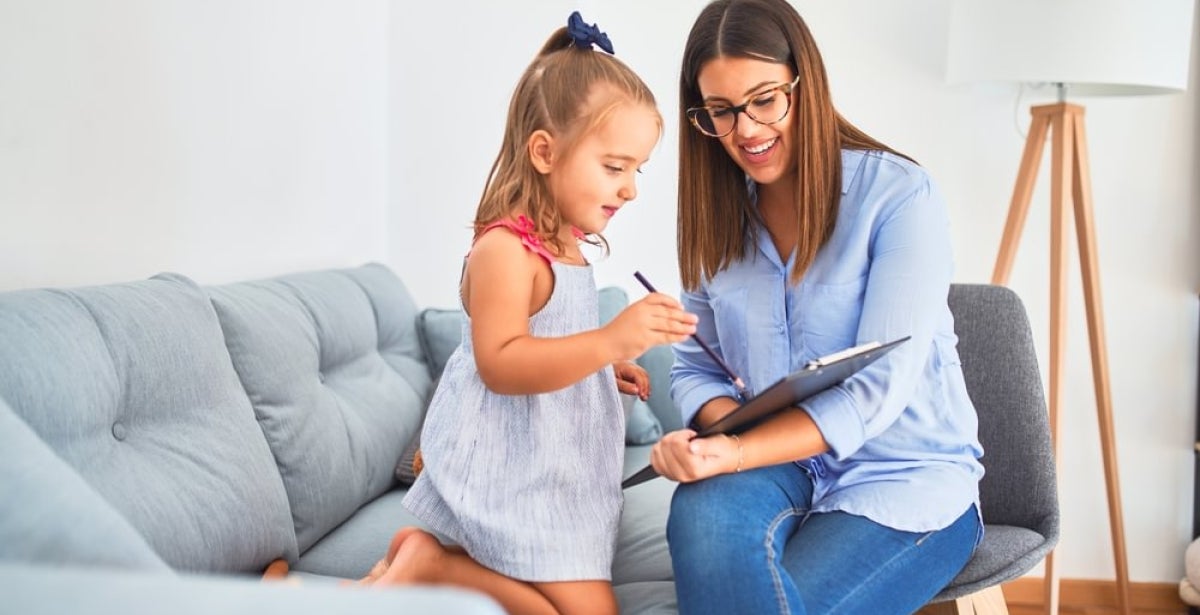
How to support mental health in early childhood
In 2015, three of the five leading burdens of disease in children aged 5-14 were mental health disorders. Common mental health conditions in children include anxiety, depression and behavioural disorders.
Since the COVID-19 pandemic, there is new evidence suggesting that children’s mental health has been negatively impacted. These results reinforce the important question of how to support mental health in childhood and the benefits of early intervention in mental health.
How can we look after our child’s mental health?
Good mental health in early childhood is the foundation of how children build friendships and develop the resilience they need to adapt and deal with life’s challenges.
Deirdre Brandner is a Paediatric Psychologist who knows the impact of mental health in early childhood more than most. Deirdre was a primary school teacher who retrained to become a registered psychologist.
Throughout her career, she has worked with children and adolescents in educational settings and private practice. Deirdre explains, “My role, while supporting the child, is also often supporting the parent or the educational setting they are in.”
Deirdre shares her insights on children's mental health awareness and helps parents and other adults who may be struggling with common mental health disorders in children.
How COVID-19 is impacting the mental health of kids
There is no denying that the COVID-19 pandemic has been hard on all parts of society, especially on already vulnerable groups like the elderly and those who are immunocompromised. We have all experienced varying levels of fear, uncertainty, anger and despair. And not just because of the lockdowns, but also because of the overall disruptions to life as we knew it.
Deirdre says that supporting children’s mental health during COVID-19 was something completely unique for mental health nurses and professionals to navigate. In Deirdre’s experience, the impact has been substantial.
“Undoubtedly, I have seen a significant effect,” she explains. “This was not just with my current clients. What we saw was that populations that were already vulnerable became more vulnerable. Children who were neurotypical have also now been exposed to more experiences of anxiety, low mood and poor self-regulation.”
What has been interesting for Deirdre is the way this is manifesting in children after the era of lockdowns.
“Now that children are mostly back in classrooms, children that normally wouldn’t have experiences of anxiety or difficult social interactions are now displaying that.”
Deirdre’s experience is not isolated. Research has found that during and after isolation and social distancing, children are more likely to experience high rates of depression and anxiety.
Family impacts of mental health in childhood
Deirdre says that for many children, the parents and adults in their lives were also reporting feelings of anxiety and being overwhelmed by the unknown. For children, this meant that the anchors in their world—the adults in their lives—were less stable.
“For children, routine and predictability are what they rely on to feel okay in the world,” she explains. “Throughout the pandemic, that was completely thrown out the window.”
“Children have lost trust in the world. They haven’t lost trust in their parents, but they have lost trust in the world as it exists.”
Take the example of birthdays. In the first year of COVID-19, children could not have the celebrations they usually would. Parents comforted their children by telling them that they would be able to have a proper celebration the following year. Then that didn’t happen.
“With children, once you cannot get them over the line twice, they begin to lose faith because it was always a given,” says Deirdre.
Educational impacts of mental health in childhood
With school closures and home learning through the pandemic, impacts on children’s education were quite considerable.
Deirdre admits that the research is still being done and that children are still feeling the effects of pressing pause on their developmental years.
“What we are seeing is the short-term effects,” she says. “Some children were educationally vulnerable or unable to access remote learning because of their family environment. That will have a flow-on effect.”
“For a child that is now in Year 2, they’ve had a disruptive first two years of education. They have missed that early literacy that really needs to happen face-to-face.”
For older students at the tail-end of their education, it has been a similar story. They have missed those crucial learning experiences that provide academic rigour. Within this age group, Deirdre says that the other concern is around children who have not returned to school at all.
Social impacts of mental health in childhood
As a psychologist, Deirdre says that she is less worried about academic impacts and more so about the critical points of social interaction.
“I am seeing children not trusting friendships as much,” reveals Deirdre. “In the midst of this, children seem to have a greater sense of desperation to want to lock in friendships. And then there is an increased vulnerability when those friendships don’t turn out.”
“Lockdowns were disruptive. But so, too, was the return to the classroom. With high levels of teachers and children away with COVID-19, the environment has been quite inconsistent.”
“After two years of interrupted social interactions, children do not have the bank of evidence they need about their friendships,” says Deirdre. “It is not because of anything the children have done wrong or because they do not have good friends. They just have not had the opportunity.”
“If you want to help children become resilient, overcome anxieties and develop trust in friendships, this bank of evidence is really crucial.”
How to help a child with mental health issues
The benefits of early intervention in mental health are widely known. But what about children? How can you help children’s mental health as a parent or someone who works with children?
Deirdre shares three things you can do to make a difference.
1. Let the child take the lead
Firstly, it’s important for parents to acknowledge how their child is feeling. But Deirdre cautions against attempting to ‘fix’ things by social engineering situations. If you want to know how to support children’s mental health, it is about shifting expectations and letting the child take the lead.
“Allow the child to access social opportunities they want to engage in,” she says. “If they are reluctant to re-join their netball team, respect that. Then, gradually provide opportunities for them to ease back into it.”
Parents cannot protect their children from everything. But Deirdre advocates for not thrusting children into situations that the adults in their lives believe will be the fix. Awareness of a child’s needs is vitally important.
2. Be a sounding board for the child
Mental health in early childhood and adolescence often requires a different response. However, according to Deirdre, the important thing is that you always make space for the child.
For teenagers, this is very much about listening and acting as a sounding board for their problems.
“Adolescents want you to listen,” says Deirdre. “Even if you know what the solution is, that is not what they want from you. Acknowledge how they are feeling and then present them with some gentle options, such as speaking to someone at school or another family member. It’s really important to keep the communication lines open.”
For primary-school aged children, Deirdre advocates for a slightly different approach.
“This age group is often more willing to accept help from a parent,” she says. “A younger child might burst into tears just as they are heading to bed because of something that is worrying them.”
“Often this is when the parents are also depleted from the day and the child might not even really want to talk about the issue. If that is the case, ask them to tell you three things that they have big feelings about. Tell them that it is now your job to hold onto those feelings so you can talk about them at a better time.”
3. Look out for the alarm bells
If you ask a young person if there is anything wrong, you are unlikely to get an answer. Deirdre explains that you need to look for some common signals and behaviours instead, something that differs for younger children and older adolescents.
“In young children, around eight or younger, changes tend to be more physiological,” she says. “Things like changes in eating, toileting or sleep. Emotional distress can often present in things like tummy aches, needing to go to the toilet or feeling like they can’t breathe. They may also be more irritable than normal and may have some issues with friends.”
In adolescents, Deirdre tells parents to look out for a retreat, shutdown or changes in behaviour that don’t seem right.
Drive positive impact in child and adolescent mental health with VU Online
There is no denying that being able to help a child with mental health issues can be a rewarding career. If you have ever considered becoming a mental health worker or expanding your knowledge of mental health, you are not alone. Many parents and industry professionals understand why mental health is an issue for children and adolescents and they want to make a difference.
VU Online’s Master of Child and Adolescent Mental Health will allow you to build on your prior experience and undertake study that will help transform child and adolescent mental health services in Australia. Gain skills that you can apply across educational, therapeutic, community and clinical settings.
Study the only university mental health qualification in Australia specifically designed to focus on engaging and working with children and adolescents. With varying career pathways and roles such as school counsellor, mental health and wellbeing coordinator, or school mental health practitioner, this is your chance to make a difference and help children and families in real and meaningful ways.
VU Online’s postgraduate Block Model means that you complete each unit in a eight-week block. You do not need to try juggling multiple subjects at once. Instead, you can focus on one subject at a time. This is your chance for hands-on, immersive learning about mental health interventions for young people.
Take the first step in your new career
Supporting adolescent mental health is imperative for parents, as well as other adults who work with children. If you want to make a positive difference beyond your own family or circle of influence, a qualification with VU Online will help you discover new opportunities and advance your career.
Take the first step towards an empowering and rewarding profession. Learn more about the Master of Child and Adolescent Mental Health.



